With just two months to go until the new workplace recycling law comes into effect, the food and drink venue in Cardiff Bay, has reported a 60-70% saving in waste disposal costs through recycling since making changes to the separation of its waste.
Since 2020, all Mermaid Quay restaurants, bars and retail outlets have been equipped with specified bins for different types of waste like food, cardboard, plastics, and general waste – in line with forthcoming workplace recycling law.
From 6 April, it will become law for all businesses, charities, and public sector organisations to sort their waste for recycling, in the same way as households do across most of Wales.
Julie James, Minister for Climate Change said: “Wales’s new workplace recycling law will help improve both the volume and quality of recycling we collect each year. This is not only important in delivering against the climate and nature emergency but will crucially also deliver benefits to the economy by capturing a resilient supply of high-quality recycled materials. This shows how we can work together to reduce our environmental impact and lay the foundations for a stronger, greener economy.”
Becky Jones, Marketing Manager from Mermaid Quay said: “Given the numerous businesses within Mermaid Quay, we supplied tenants with a waste strategy guide in their tenant handbook, ensuring they have all the necessary tools to ensure proper waste and recycling disposal. We provided them with signage, color-coded bins, and stickers, facilitating efficient sorting before transportation to our service yard for secondary segregation. This has resulted in our recycling rates going up, while our waste management costs are going down because we’ve seen less general waste pickups, which would’ve been the larger portion of waste removal from the site.”
Becky added: “While it may appear daunting, the process is surprisingly straightforward, and it makes a huge difference in the long run. It’s not a huge change but it will have a positive impact once the procedure is in place. Sustainability is at the forefront of our decisions, and when tenants and visitors see what we’re doing it gives them a much more positive view of us as a business.”
Executive Director of the Environmental Services Association, Jacob Hayler, said: The new Workplace Recycling Regulations mark another large step forward for Welsh recycling, building on the successful household system.
The recycling and waste management industry very much supports measures to harmonise requirements, which reduces confusion, increases participation, and boosts performance. The certainty that clear and timely regulation provides also enables industry to invest in, and deliver, the services needed to support higher recycling rates.”
The aim of the new recycling law is to increase the quality and quantity of recycling, while keeping materials in use for as long as possible. This will bring significant economic opportunities, support supply chains, build greener communities, and support a circular economy for Wales.
In just 20 years, Wales has gone from recycling less than 5% to recycling 65% of our waste and is now ranked third in the world. This helps to save around 400,000 tonnes of carbon emission every year. The new law will continue to improve these recycling rates and support Wales’ commitment to become a zero-waste nation by 2050.
For more information on how the changes will affect your business and for help, guidance, and support on what you need to do visit www.gov.wales/workplace-recycling.
Advice for workplaces preparing for the new legislation:
- Plan ahead – find out what the changes mean to you, what you need to do to comply and allow plenty of time to implement changes.
- Talk to your recycling and waste collector – you need to make sure they can collect your separated waste.
- Look at where and how your waste is collected – can you reduce the amount of waste you produce? What materials will you need to separate and what is the best way to do it.
- Think about what internal and external bins you might need – what containers will you need for each of the different recycling materials.
- Communicate – develop a plan to communicate the changes to staff, guests, visitors, customers etc so they understand what they need to do with their waste.
- Think about health and safety – make sure your bins are accessible, are easy to access and move.

